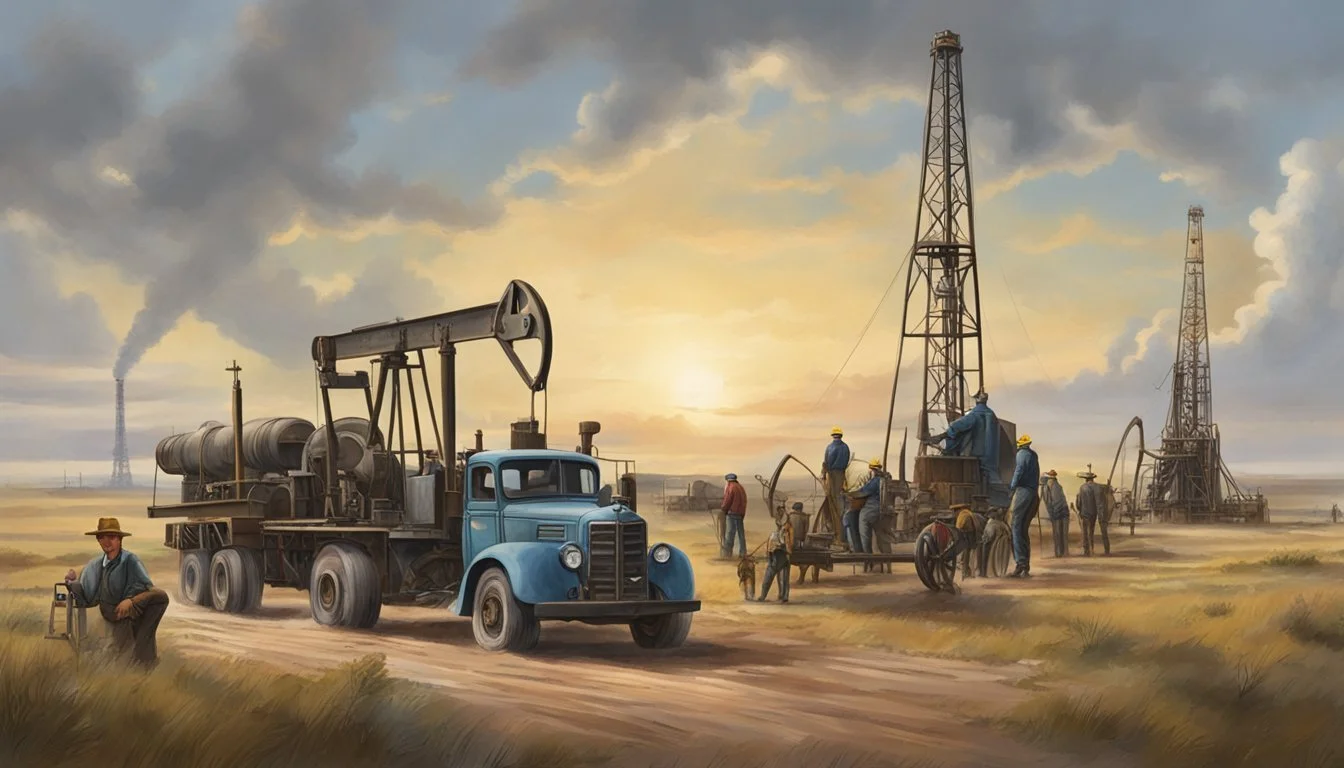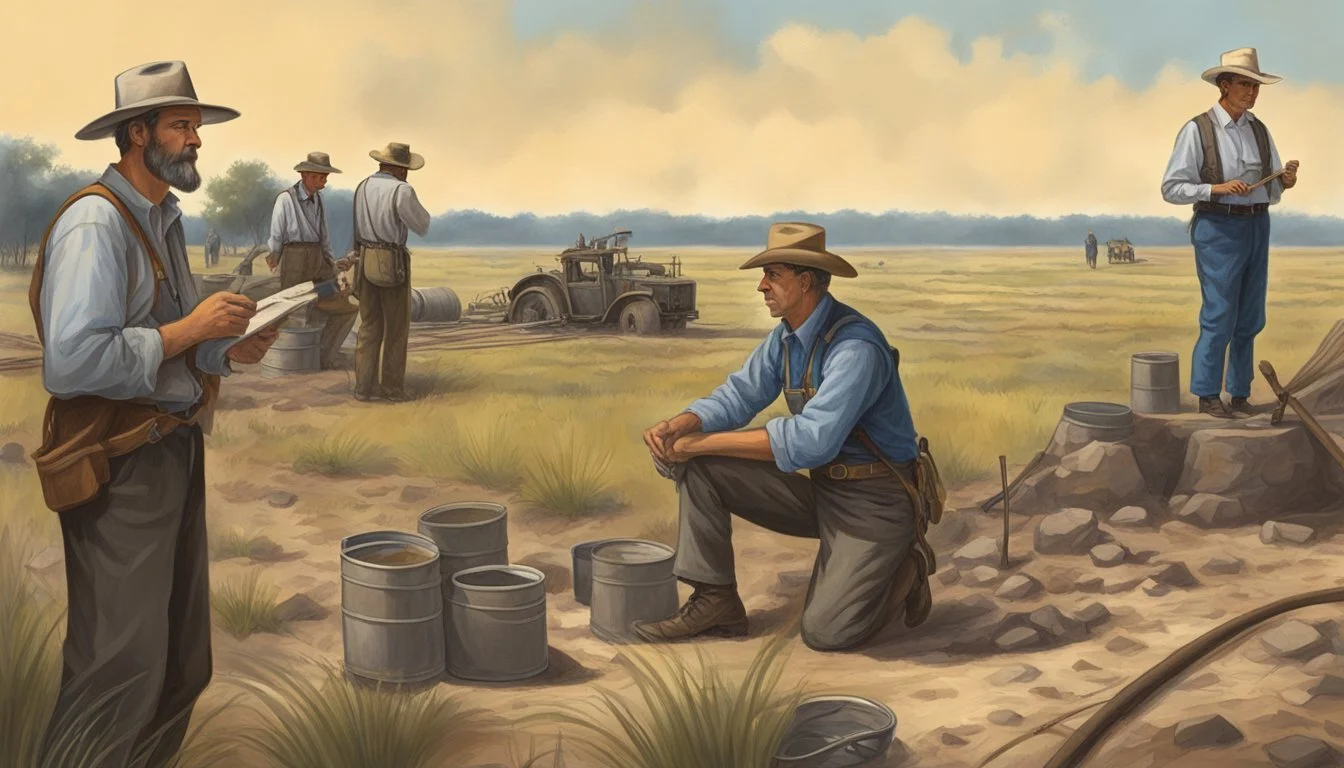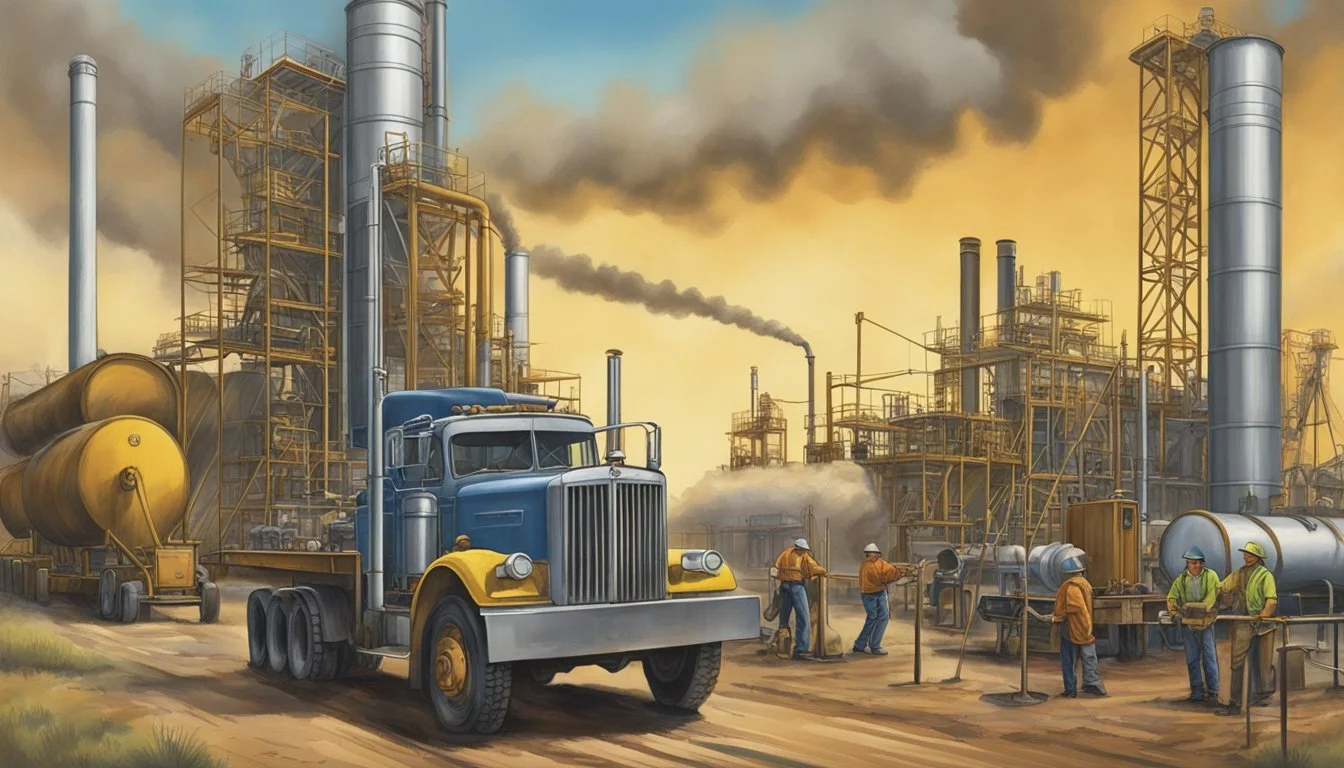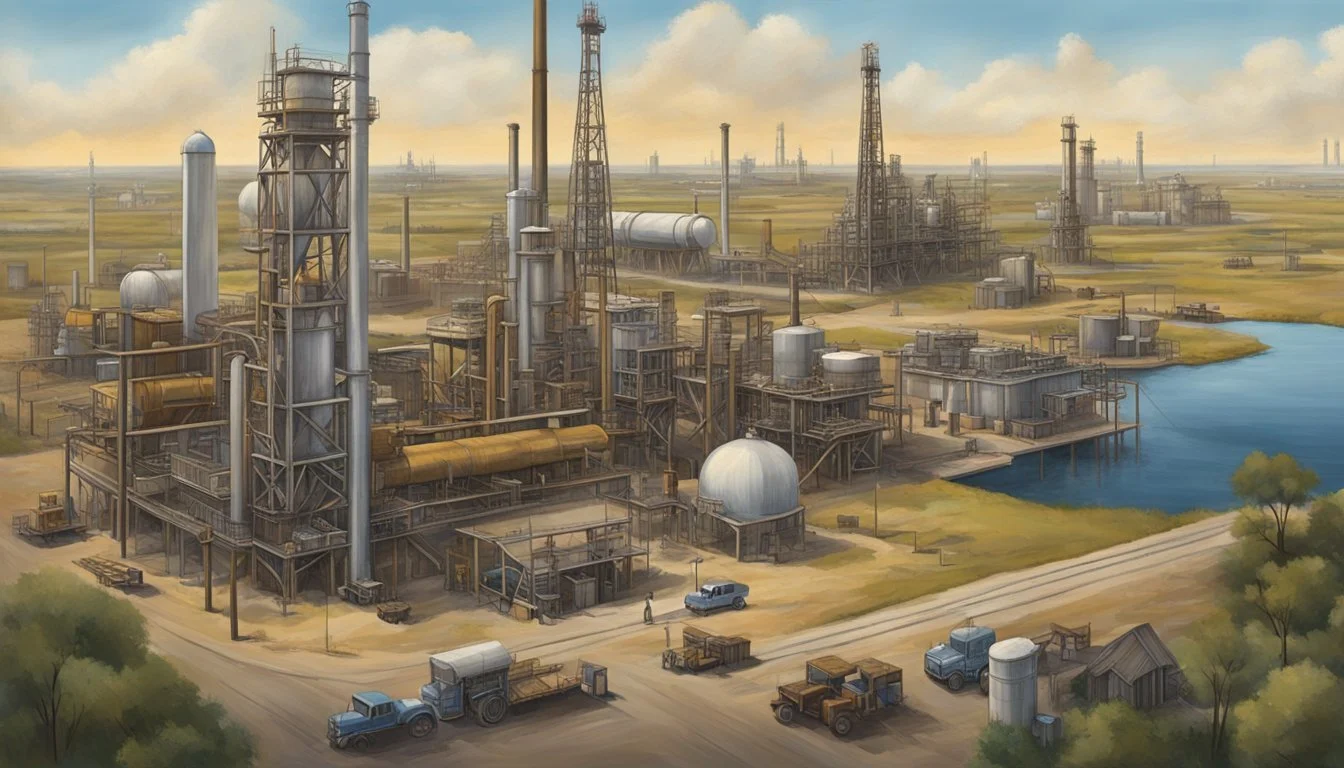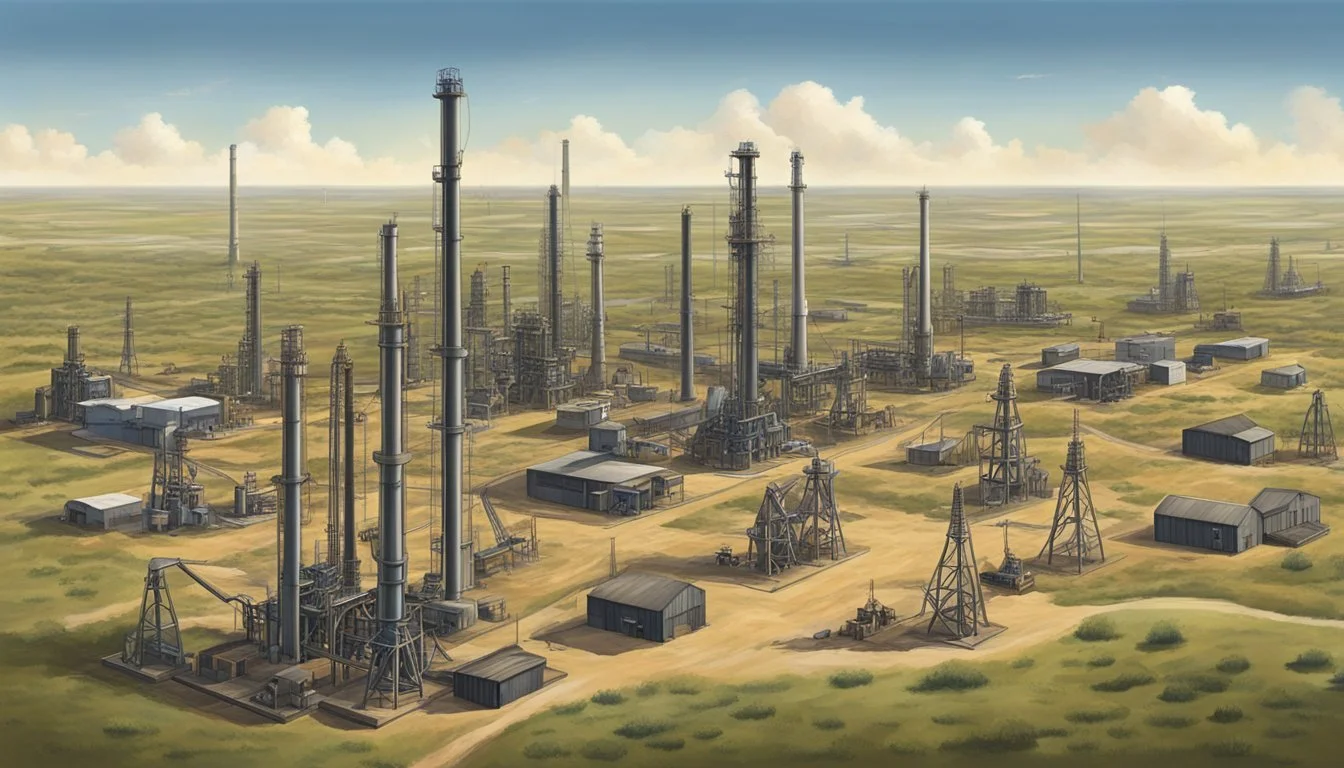The Role of German Texans in the Texas Oil Boom
Pioneers and Impact
The Texas oil boom, which began with the fabled gush at Spindletop near Beaumont in 1901, marked a period of significant transformation in the Lone Star State. As oil derricks sprouted across the Texas landscape, they not only shaped the physical and economic terrain of the region but also brought diverse groups of people together, including German Texans. These settlers, who had been in Texas since before the Civil War, found themselves at the crossroads of a cultural and industrial revolution.
German immigrants and their descendants played an understated yet crucial role in this transformative era. Their contributions ranged from technological innovation to the diligent labor that was needed to sustain the burgeoning industry. While the prototypical image of oil barons and wildcatters often overshadows the roles of various ethnic groups, the truth of the oil boom is that it was a mosaic of American grit, perseverance, and ingenuity.
As communities around petroleum reserves thrived, German Texan entrepreneurs, engineers, and workers tapped into their well-established presence in Texas and adapted to the changing economic conditions. They made pragmatic decisions and strategic moves that further integrated them into the fabric of Texas society during the oil boom era, helping to lay the groundwork for the state's modern energy sector and contributing to the diverse cultural heritage that defines Texas today.
Historical Context of German Texan Influence
In the tapestry of Texas history, the thread of German Texan influence is both vibrant and substantial. Their impact on the state's development, particularly during the Texas oil boom, forms a rich legacy defined by a pioneering spirit and cultural resilience.
Early German Settlement in Texas
German immigrants began arriving in Texas during the 1830s, enticed by the promise of land and opportunity in the New World. They established significant settlements, particularly in Central Texas' rural Hill Country. This influx intensified in the years following the 1848 war in Germany, leading to a steady population growth marked by the establishment of tight-knit communities. Many settlers were fleeing political unrest and sought to retain their cultural identity in their new homeland.
The railroads were vital to their success, connecting their rural communities to the burgeoning urban centers. Access to the railroads expanded economic opportunities and allowed for the transport of goods, fostering further growth and integration into the Texan economy.
German Texan Culture and Society
German Texans cultivated a society that preserved their linguistic, musical, and architectural heritage. They founded cultural institutions such as schools, churches, and social clubs to maintain their traditions.
Language: The use of the German language was prevalent, and it played a key role in the daily lives and education of German Texans. However, during World War I, this trait led to a backlash, with laws being passed to restrict the use of German in public spaces.
Music and Festivities: German Texans introduced classical and opera music to the state, along with social events like biergartens, reflecting their love for communal festivity.
Economic Influence: Industrious and resilient, German Texans quickly adapted to their new environment. They engaged in various trades and were instrumental in sectors such as agriculture, brewing, and during the oil boom of the 20th century, participated actively in the burgeoning oil industry.
Their contribution to Texas set the stage for a diverse economic and cultural landscape that thrived as the state underwent significant transformations from a rural frontier to a powerhouse of industry and innovation.
Origins of the Texas Oil Boom
The Texas oil boom began with groundbreaking discoveries that shifted the state's economic landscape, fueling rapid industrialization and the rise of the oil industry.
Discovery of Spindletop
On January 10, 1901, a significant oil discovery at Spindletop Hill near Beaumont, Texas, marked the birth of the modern petroleum industry. Patillo Higgins and Captain Anthony F. Lucas, the leading figures in this enterprise, utilized a pioneering drilling technique that culminated in the famous Lucas Gusher. This event produced an astonishing flow of oil and subsequently attracted investors, which catalyzed the growth of the oil industry in Texas and across the United States.
Location: Spindletop Hill, near Beaumont, Texas
Date of Discovery: January 10, 1901
Significant Figures: Patillo Higgins and Captain Anthony F. Lucas
Outcome: Surge in oil industry investments and growth
Gusher Age and Early Oil Discoveries
Following the Spindletop discovery, the "Gusher Age" became a defining era of oil explorations and subsequent discoveries that transformed the energy sector. Early oil finds, notably in Corsicana in 1894 and later in East Texas, set a precedent for the oil boom. These discoveries contributed to a substantial increase in oil production, thereby securing Texas' position as a dominant force in the petroleum industry.
First Discovery: Corsicana, 1894
Impact on Texas: Establishment as a leading oil producer
Impact on Petroleum Industry:** Innovations in drilling technology and production practices
Each discovery spurred economic and industrial developments, shaping the landscape of Texas and the global oil market.
Economic Impact and Growth
The Texas oil boom catalyzed profound economic growth and industrialization, significantly shaping both the state and national economy. This growth was further bolstered by the contributions of German Texans, who were influential in the expansion of the oil-related industries.
Contribution to State and National Economy
German Texans played a crucial role in the Texas oil boom, contributing to a surge in economic prosperity that benefited the state and the United States as a whole. Their participation ranged from investing in oil ventures to providing skilled labor necessary for the burgeoning industry.
Texas Oil Boom: Triggered by the discovery near Beaumont in the early 20th century, this period saw Texas becoming a dominant force in U.S. oil production.
Economic Growth: The influx of capital and jobs led to Texas experiencing unprecedented economic expansion, with impacts felt on a national scale.
Industrialization: The oil boom accelerated the development of new technologies and infrastructure, moving Texas from a rural economy to an industrial powerhouse.
Development of Oil-Related Industries
The involvement of German Texans was instrumental in the establishment and growth of refineries and petrochemical plants, which are critical components of the oil industry ecosystem.
Refineries: German Texans utilized their expertise to aid in the construction and operation of refineries that transformed crude oil into valuable products, solidifying Texas as an industrial leader.
Throughout Texas: They established a network of refineries that collectively processed a significant portion of U.S. production.
Petrochemical Plants: As the oil industry flourished, so did the petrochemical sector, providing the foundation for a diverse economy.
Indirect Impact: The petrochemical industry generated a multitude of related jobs and industries, solidifying the state's economic standing.
In this way, German Texans substantially contributed to the economic landscape during the Texas oil boom, fostering growth and diversification in the state's economy.
Technological Advancements in Oil Production
During the Texas oil boom, significant technological advancements were instrumental in shaping the petroleum exploration industry. Geologists played a crucial role in identifying oil-rich regions, employing seismic technology and subsurface mapping to pinpoint potential drilling sites. Technological breakthroughs enabled these scientists to analyze geological formations with greater precision, leading to more efficient and successful oil extraction.
Oil derricks, a common sight across Texas during the boom, evolved over time. The iconic wooden structures gave way to steel derricks, which were both stronger and allowed for deeper drilling. As technology advanced, rotating drilling rigs introduced the capability to bore through thousands of feet of earth, tapping into previously inaccessible oil reserves.
The integration of technology in petroleum exploration led to a boom in productivity and efficiency in oil production. Below is a summary of key technological improvements:
Seismic Surveying:
Before: Geologists relied on surface observations.
After: Utilized controlled explosions and seismographs to map subsurface formations.
Drilling Technology:
Before: Simple cable-tool drilling.
After: Rotary drilling, allowing for deeper and quicker well creation.
Materials:
Wood: Early derricks were prone to fire and decay.
Steel: Improved durability and allowed for the exploitation of deeper reserves.
These advancements not only maximized the extraction of oil but also minimized environmental impact by reducing the number of dry wells drilled and optimizing the use of resources. As a consequence, the Texas oil landscape became a testament to the power of innovation and the indelible mark it leaves on industry growth.
Key Personalities and Business Ventures
The Texas oil boom saw the rise of numerous industry magnates and the establishment of influential companies, with several German Texans playing pivotal roles.
Influential German Texan Oil Entrepreneurs
German Texan entrepreneurs leveraged the burgeoning oil industry to build substantial wealth and influence. Among them, H. L. Hunt and Clint Murchison stand out for their entrepreneurial spirit and business acumen. Hunt started as a poker player and used his winnings to invest in oil, eventually acquiring the East Texas Oil Field. This savvy business move cemented his status as one of the most successful individuals in the oil industry. Murchison, another prominent figure, capitalized on oil and real estate, significantly impacting the Texas economy.
Major Oil Companies and Industry Leaders
The landscape of the Texas oil industry was also shaped by prominent companies and industry leaders. H. Roy Cullen and Sid W. Richardson were among the leaders who made their mark.
H. Roy Cullen advanced the industry through his company, Quintana Petroleum, which thrived after discovering oil reserves in the Texas Gulf Coast. His ability to seek out significant oil fields and manage profitable ventures was a testament to his expertise.
Sid W. Richardson, an independent oil producer, became one of the foremost figures in the Texas oil business. His investments and leadership in multiple oil fields yielded considerable returns and helped transform the industry.
By harnessing the vast oil reserves of Texas, these businessmen played an integral role in the proliferation of the oil boom and the ensuing economic prosperity. Their successes laid the groundwork for a robust state economy, propelled by the oil industry's continued growth.
Regulatory Environment and Oil Policies
In the earlier days of the Texas oil boom, German Texans, along with other oil industry stakeholders, witnessed the birth of complex regulatory mechanisms designed to oversee petroleum extraction. The Texas Railroad Commission (RRC), established in 1891, played a pivotal role in this regulatory environment.
Initially focused on railway regulation, the RRC's jurisdiction expanded to include the burgeoning oil and gas industry by the early 20th century. They were bestowed with the authority to:
Regulate production: To prevent overproduction, the RRC could set allowable production rates.
Manage disputes: It served as the arbiter in conflicts among producers or with the community.
Ensure safety: The commission set standards to mitigate the risks inherent in oil and gas production.
German Texans, influencing regional development, often complied with RRC regulations, which indirectly helped to stabilize the oil markets and protect the petroleum reserve. Their engagement in the economic fabric was acute, emphasizing efficiency and sustainability within their operations.
The regulatory framework was not static. As the industry evolved, so did the policies implemented by the RRC. They are credited with preserving the integrity of the Texas oil economy through interventions such as:
Prorating: Imposing limits on the amount of oil wells could produce.
Conservation policies: Introducing rules to curtail wasteful practices and promote the conservation of oil reserves.
Regulations have since expanded beyond state lines, with federal agencies playing a larger role in dictating environmental policies. Nevertheless, the RRC continues to be a significant force in managing Texas' oil and gas resources and shaping the impact of the industry on the state's economy and environment.
Global Impact and the Shift in Oil Dynamics
The Texas oil boom, significantly influenced by German Texans, notably altered the global oil dynamics, establishing Texas as a pivotal player in the international market and influencing worldwide export policies during World War II.
Texas in the Global Oil Landscape
Texas emerged as a key contributor in the global oil landscape due to its substantial oil reserves and production capabilities. By the mid-20th century, it became one of the leading oil-producing states, positioning the United States alongside countries in the Middle East as a dominant force in the energy sector. This growth not only transformed the economy of Texas but also had far-reaching implications for American oil production as a whole.
Major milestones:
1930s: Discovery of vast oil fields in Texas
1940s: Surge in production during World War II
Texas's role in the oil industry was amplified by the technological advancements and innovations brought forth by German Texans, who played a vital role in developing the state's oil extraction and refining processes.
World War II and Export Policies
During World War II, the strategic importance of oil was underscored as it became a crucial resource for military operations. Texas's oil production was instrumental in supporting the Allied forces. Export policies during this period were heavily influenced by the need to secure a consistent oil supply for the war effort.
Export dynamics:
Pre-World War II: Limited exports due to growing domestic demand
1941-1945: Increased exports to support Allied military needs
The export policies of the United States during World War II reflected the nation's need to balance between supporting allies overseas and maintaining adequate supplies at home. Texas's oil output was at the forefront of this balancing act, showcasing the state's strategic contribution to both the national and global arenas during a time of profound geopolitical upheaval.
Cultural and Social Ramifications
The Texas oil boom brought significant changes to the social and cultural landscape of the state, with German Texans playing a pivotal role in shaping boomtown communities and contributing to the arts and education.
The Social Fabric of Oil Boomtowns
As the oil boom transformed Texas from a largely rural state into one with burgeoning large cities, the social fabric of these areas witnessed profound changes. German Texans, who were among the first European settlers in the state, leveraged their traditions and community-oriented values to foster stable societies amidst the chaos of boomtown life. They often became leading figures in efforts to maintain social order and build infrastructure.
Community Initiatives: German Texans initiated community gatherings and social clubs, cementing bonds amongst residents.
Civic Engagement: Involvement in local governance and volunteer fire brigades helped maintain civil society.
German Texan Contributions to Arts and Education
The influence of German Texans in the arts and education was marked and enduring, reflecting the cultural heritage they cherished and adapted to their new Texan identity.
Music: German music traditions, such as polka and waltz, found new life in Texas, contributing to a unique Texan music scene.
University: They helped establish and support institutions of higher learning, including Texas' first university, where they advocated for a comprehensive liberal arts education.
_Cultural Preservation: Through maintaining their language and customs, German Texans enriched the state's cultural mosaic. This was evident in the establishment of various cultural festivals, including the famous Wurstfest in New Braunfels.
The role of German Texans during the oil boom was multifaceted, extending beyond industry alone to leave a lasting imprint on the state's cultural and social institutions.
Impact on Land and Environment
In the wake of the Texas oil boom, German Texans, like other groups, witnessed profound alterations in both land utilization and the environmental landscape. As they engaged in the burgeoning oil industry, the transformation was twofold: economically beneficial, yet challenging for the natural terrain.
Land Transformation:
Oil derricks proliferated across Texas, rapidly transforming the rural and agrarian landscapes that many German immigrants initially settled in.
The search for oil led to intensive land development, which, in some instances, clashed with traditional German farming practices.
Environmental Considerations:
Oil extraction processes, and the infrastructure necessary to support them, often disrupted local ecosystems.
German Texans, involved in these activities, had to contend with the environmental consequences, such as spoilage of farmland and potential contamination of water sources.
Pollution:
The rise of the oil industry inevitably led to increased pollution.
Oil spills and leaks from derricks and storage facilities posed direct threats to both land and water environments.
Despite the economic boom, German Texans faced the challenge of balancing their economic interests with the preservation of the environment. Their role in the oil industry helped shape Texas, but it also required an evolving relationship with the land they worked and lived upon.
The Legacy of German Texans in the Oil Industry
The Texas oil boom had a transformative effect on the state, revamping the local economy and contributing to the emergence of some of the wealthiest and politically powerful figures in the American West. Among these influential players were German Texans, a group whose participation in the oil industry is both significant and enduring.
German immigrants and their descendants applied their diligent work ethic and business acumen to the booming oil industry. Investment from German Texans in the early part of the 20th century played a critical role in developing the infrastructure necessary to capitalize on the vast oil reserves discovered in Texas.
Key Figures: Notable individuals of German descent, such as oil baron Robert J. Kleberg and military leader Admiral Chester W. Nimitz, underscore the profound influence German Texans had within and beyond the oil fields. These two represented the spectrum of German Texan involvement, from local industry to broader societal impact.
Cultural Influence: A sense of nostalgia persists regarding the role German Texans played in the oil boom. Their legacy permeates through the cultural fabric of Texas, with various townships and communities retaining distinct German characteristics. The enduring nature of their influence is evident through continued references in Texan culture and history.
Economic Contributions: German Texans were instrumental in establishing an economic stronghold in the state through their foresight in oil-related investments. Their involvement laid the groundwork that allowed Texas to thrive economically and become a beacon of prosperity in the American West.
The Future of Oil in Texas
With the Texas oil and gas industry contributing significantly to the state's economy, future prospects remain closely tied to innovative practices and diversification strategies that address both market demands and environmental concerns.
Diversification and Sustainability
Economic resilience in Texas increasingly hinges on the industry's ability to diversify. Stakeholder investments in the Permian Basin and Southeast Texas are gradually expanding beyond traditional oil extraction to include renewable energy sources and sustainable practices. This strategic shift not only secures long-term economic stability for the state but also aligns with global trends towards cleaner energy.
The Texas State Library archives elucidate this transition, documenting legislative efforts and public policies that incentivize green initiatives. By embracing diversification, Texas is poised to maintain its role as an energy leader while fostering a sustainable and robust economic future.
Technological Innovations and the Energy Transition
Technological advancements are propelling the Texas oil sector into a new era. The industry's commitment to technology is evident through enhanced oil recovery techniques and the integration of digital technologies which optimize drilling and production processes. These innovations are crucial for the energy transition, making operations safer, more efficient, and less environmentally invasive.
As oil companies in Texas navigate the complexities of a changing energy landscape, they are investing in research and development that paves the way for a smoother transition to a lower-carbon future. The synergy between the oil sector and technology is not just transforming the industry but is also reinforcing Texas's economic fortitude in a competitive global market.
Sources and Further Reading
For those interested in exploring the rich tapestry of German Texans' involvement in the Texas oil boom, a range of sources are available that can provide deeper insights into their contributions and experiences. Libraries and collections offer a wealth of information for researchers and history enthusiasts alike.
Libraries and Collections:
Texas State Library and Archives Commission: Researchers can access a wide array of documents and archives detailing the economic and social history of Texas, including the impact of German Texans during the oil boom era.
Website: www.tsl.texas.gov
DeGolyer Library, Southern Methodist University: Known for its extensive collection of historical photographs, manuscripts, and prints, the DeGolyer Library is an invaluable resource for anyone studying the history of Texas oil.
Website: www.smu.edu/libraries/degolyer
Recommended Reading:
The Dark Bounty of Texas Oil: An article offering a historical look into the Texas oil industry, with possible insights into the lives of German Texans during that period. It can contain personal accounts or visual records illustrating the intersection of culture and industry.
History of the German Texans: While not exclusively about the oil industry, this resource informs about the broader context of German-Texan history, providing potential background on their economic activities, including oil-related endeavors.
Photographic Records:
Prints and Photographs Collection: For a visual journey through Texas's oil history, these collections often house photographs that capture the period, including those reflecting German Texan contributions.
Inquire at major Texas libraries or research institutions for access to specific collections.
Websites for Additional Information:
Websites dedicated to Texas history often feature sections on the oil boom and may provide articles, photographs, and biographical sketches touching on the German-Texan experience.
The aforementioned resources provide a solid starting point for anyone seeking a confident and clear understanding of the German Texans' role during the transformative years of the Texas oil boom.

